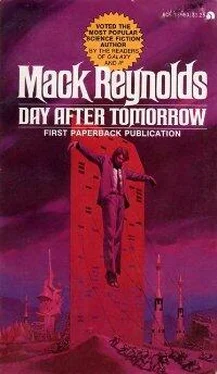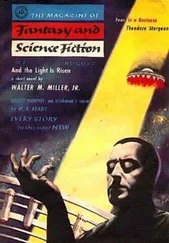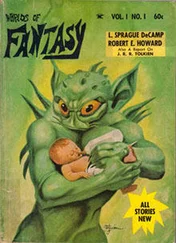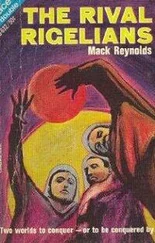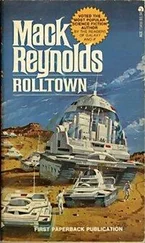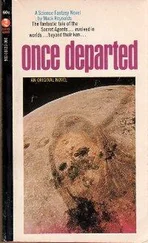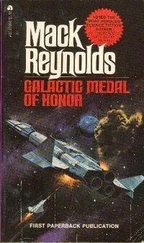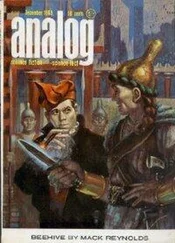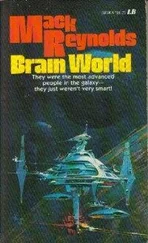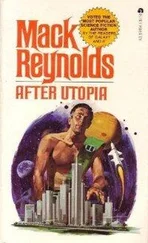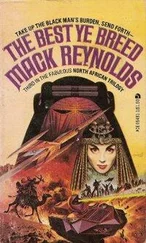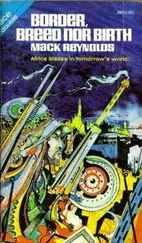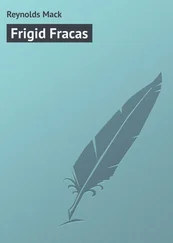Day After Tomorrow
by Mack Reynolds
Government employees in his income bracket and the suburb in which he lived were currently wearing tweeds. Tweeds were all the thing. Tweeds were in. You weren’t with it if you wore anything else.
Lawrence Woolford consequently wore tweeds. His suit, this morning, had first seen the light of day on a hand loom in Donegal, Ireland. It had been cut by a Swede widely patronized by serious young career men in Lawrence Woolford’s status group. These days, English tailors were out and Italians absolutely unheard of.
Woolford sauntered down the walk before his auto-bungalow, scowling at the sportscar at the curb—wrong year, wrong make. Thanks to the powers that be, it was still the right three-tone color. But he’d have to trade it in on a new model. It was a shame in a way—he liked the car. However, he had no desire to get a reputation as a weird among colleagues and friends. What was it Senator Carey McArthur had said the other day? Show me a weird and I’ll show you a person who has taken the first step toward being a Commie.
Woolford slid under the wheel, dropped the lift lever, depressed the thrust pedal gently and took off for downtown Greater Washington. Theoretically, he had another four days of vacation coming to him. He wondered what the Boss wanted. That was the trouble in being one of the Boss’ favorite trouble-shooters; when trouble arose you wound up in the middle of it. Whether you wanted to or not. Lawrence Woolford was to the point where he was thinking in terms of graduating out of field work and taking a desk job, which meant promotion in status and pay. He had to like it.
He turned over his car to a parker at the departmental parking lot and made his way through the entrance utilized by secondgrade departmental officials. In another year, he told himself, he’d be using that other door.
The Boss’ secretary looked up when Lawrence Woolford entered the anteroom where she presided. “Hello, Larry,” she said. “Hear they called your vacation short. Darn shame.”
LaVerne Polk was a cute little whiz of efficiency. Like Napoleon and his army, she knew the name of every member of the department and was on a first name basis with all. However, she was definitely a weird. For instance, styles might come and styles might go, but LaVerne dressed basically for comfort, did her hair the way she thought it looked best, and wore low-heeled walking shoes on the job. In fact, she was willing and able to snarl at anyone, no matter how kindly intentioned, who even hinted that her nonconformity didn’t help her promotion prospects.
Woolford said, “Hi, LaVerne. I think the Boss is expecting me.”
“That he is. Go right in, Larry.”
She looked after him when he turned and left her desk. Lawrence Woolford cut a pleasant figure as thirty-year-old bachelors go.
The Boss looked up from a report which he had been frowning at, nodded to his ace field man and said, “Sit down Lawrence. I’ll be with you in a minute. Please take a look at this while you’re waiting.” He handed over a banknote.
Larry Woolford took it and found himself a comfortable chair. He examined the bill, front and back. It was a fifty dollar note, almost new. He couldn’t see anything special about it.
Finally, the Boss, a stocky, tight-faced, domineering but impeccable career bureaucrat, scribbled his initials on the report and tossed it into an Out chute. He said to Woolford, “I am sorry to cut short your vacation, Lawrence. I considered giving Walter Foster the assignment, but I think you’re the better choice. It might take quite a bit of thinking on your feet.”
Larry decided that faint praise was the best tactic. He spoke earnestly, though he detested Foster, his closest rival, “Walt’s a good man, sir. One of the best when you’re in the clutch.” And then, “What’s the crisis?”
“What do you think of that fifty?” The Boss indicated it with a thumb.
His troubleshooter looked down at it. “What is there to think about it?”
The Boss grunted, slid open a desk drawer and brought forth another bill. “Here, look at this, please.”
It was another fifty. Larry Woolford frowned at it, not getting whatever was going on.
“The serial numbers,” the Boss said impatiently.
They were identical. Larry Woolford whistled softly and looked up. “Counterfeit. Which one is the bad one?”
“That is exactly what we would like to know,” the Boss said.
Larry stared at his superior, blinked and then examined the bills again. “A beautiful job,” he said. “But what’s it got to do with us, sir? Counterfeiting is Secret Service jurisdiction.”
“They called us in on it. They think it might have international ramifications.”
Now they were getting somewhere. Larry Woolford put the two bills back on the Boss’ desk and leaned back in his chair, waiting.
His superior said, “Remember the Nazis turning out American and British banknotes during the Second War?”
“Before my time, of course, but I’ve read about it, somewhere or other.”
“At any rate, obviously a government with all its resources could perfectly counterfeit any currency in the world. It would have the skills, the equipment, the funds to accomplish the task. The Germans turned out hundreds of millions of dollars and pounds with the idea of confounding the Allied financial base. They also used it to pay off some of their spies.” The bureau head grunted a laugh. “That was a dirty trick.”
“And why didn’t it work—the upsetting of the Allied financial base?”
The other nodded. “The difficulty of getting it into circulation, for one thing. However, they did actually use a quantity. For a time our people were so alarmed that they wouldn’t allow any bills to come into this country from Mexico except the two dollar bills—the one denomination the Germans hadn’t bothered to duplicate. Oh, they had the Secret Service in a dither for a time.”
Woolford was frowning. “What’s this got to do with our current situation, sir?”
The Boss said, “It is only a conjecture. One of those bills is counterfeit, but such an excellent reproduction that the skill involved is beyond the resources of any known counterfeiters. The Secret Service wishes to know if it might be coming from abroad, and, if so, from where. If it’s a government project, particularly a Soviet Complex one, then it comes into the ken of our own particular cloak-and-dagger department.”
“Yes, sir,” Woolford said. He got up and examined the two bills again. “How’d they ever detect that one was bad? It’s not my field, but I’d accept either one.
“Partly luck,” his superior told him. “A bank clerk on a computer was going through a batch of fifties. It’s not too commonly used a denomination, you know. In the sheaf he was working on the serial number was duplicated. The computer picked the fact up.”
“Couldn’t the mistake have been made at the mint? Two bills with the same serial number?”
The other shook his head. “No. Evidently impossible.”
“All right. And then?”
“The reproduction was so perfect that the Secret Service was in an immediate uproar. Short of the Nazi effort, there has never been anything like it. A perfect duplication of engraving, and paper. The counterfeiters have evidently even gone to the extent of putting a certain amount of artificial wear on the bills before putting them into circulation.”
Larry Woolford said, “Once again, this is out of my line. How were they able to check further, and how many more of these did they turn up?”
“The new computers helped. Secret Service checked out every fifty dollar bill in every institution in town, both banking and governmental. Thus far, they have located ten bills in all.”
Читать дальше
